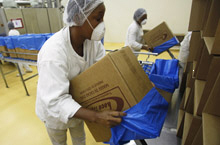
Typical street scene in Santa Ana, El Salvador. (Photo: iStock)
IMF Survey: IMF, World Bank Back $4 Billion Côte d'Ivoire Debt Relief
June 26, 2012
- Present value of Côte d'Ivoire's external debt reduced by more than 60 percent
- Debt relief reflects recent progress, notably since 2010-11 postelection crisis
- Pursuit of ambitious reform agenda key to harnessing growth potential
The IMF and the World Bank approved debt relief with a present value of $4.4 billion for Côte d’Ivoire. Combined with other debt relief, the total will be $7.7 billion.

Cocoa plant in San-Pedro, Côte d’Ivoire. Policy steps ahead of debt relief included lower taxation of cocoa production (photo: Thierry Gouegnon/Reuters)
DEBT RELIEF FOR AFRICA
Relief under the Enhanced Heavily Indebted Poor Countries (HIPC) Initiative, and additional multilateral and bilateral relief, will reduce the external debt of one of West Africa’s largest economies by slightly more than 60 percent in present value terms.
The Executive Boards of the IMF and the World Bank agreed, on June 25 and 26 respectively, that Côte d’Ivoire had satisfied the requirements to reach the final stage, or completion point, of debt relief under the HIPC Initiative.
Côte d’Ivoire will benefit from $7.7 billion in total debt reduction in present value terms, consisting of $3.1 billion in HIPC debt relief, $1.3 billion in debt relief from multilateral creditors under the Multilateral Debt Relief Initiative, and a further $3.3 billion in additional relief from the Paris Club of official bilateral creditors.

Total HIPC debt relief from the IMF and the World Bank would be $38.7 million and $412.6 million, respectively. Côte d’Ivoire’s graduation from the HIPC process brings to 33 the number of countries that have attained completion point under the HIPC Initiative since 1996 (see box).
The thirty-three
Afghanistan
Benin
Bolivia
Burkina Faso
Burundi
Cameroon
Central African Republic
Republic of Congo
Democratic Republic of Congo
Cote d’Ivoire
Ethiopia
The Gambia
Ghana
Guinea-Bissau
Guyana
Haiti
Honduras
Liberia
Madagascar
Malawi
Mali
Mauritania
Mozambique
Nicaragua
Niger
Rwanda
São Tomé and Príncipe
Senegal
Sierra Leone
Tanzania
Togo
Uganda
Zambia
“Reaching the HIPC completion point represents a milestone for Côte d’Ivoire and its population,” said Doris Ross, IMF mission chief for Côte d’Ivoire. “It reflects the significant progress achieved in economic management since the Ouagadougou peace accord of 2007 and the end of the post-election crisis in April 2011,” she added.
Ross stated that reaching completion point would also help Côte d’Ivoire normalize relations with its external creditors, which would entail an increase in debt service payable in the medium term and help further catalyze support from donors and potential investors (see chart).
“Judicious macroeconomic management will remain critical to make the country’s enormous growth potential a reality and bring prosperity to its people, while maintaining debt sustainability,” Ross said.
Engagement with IMF
Côte d’Ivoire reached the HIPC decision point, under which the country was declared eligible for debt relief, in April 2009 but progress toward the completion point was delayed in part due to the 2010–11 post-election crisis.
Since then President Ouattara’s government has maintained a sustained engagement with the IMF, starting with $129 million in support under the Rapid Credit Facility in July 2011 that served as bridge toward further support under an Extended Credit Facility arrangement of $600 million in November 2011. Prompt technical assistance also promoted capacity building and contributed to post-crisis recovery.
To reach the HIPC completion point, the authorities have advanced policy in a number of areas, including
• Poverty reduction: Preparation of a poverty reduction strategy in a participatory process, and satisfactory implementation;
• Macroeconomic stability: Satisfactory performances under the Rapid Credit Facility and the Extended Credit Facility arrangements;
• Public financial management: Publication of budget execution reports and establishment of a public procurement regulation authority;
• Health care: Increase in number of childbirths assisted by trained personnel;
• Education: Distribution of textbooks in public primary schools;
• Debt management: Quarterly publication of external and domestic public debt data;
• Transparency: Regular publication of: (i) report on payments made to, and revenue received by, the government from extractive industries—mining, petroleum, and gas—in line with Extractive Industries Transparency Initiative criteria; and (ii) certified financial accounts of the national oil company;
• Cocoa reform: A new institutional and regulatory framework, coupled with lower taxation of cocoa production.
Reaching the HIPC completion point complements Côte d’Ivoire’s economic revival and ongoing political and social normalization. Economic performance since May 2011 has surprised on the upside, with a lower than anticipated economic contraction in 2011, a fall in inflation, and rebounding fiscal revenues coupled with prudent spending, while including increases in pro-poor spending and public investment.
Business climate
The institutional strengthening that has begun will continue over the medium term to enhance economic planning, budgeting, and transparency, and to improve the business climate. Mobilizing domestic revenue and grants, and keeping nonconcessional borrowing within a sustainable range, will be crucial to finance the envisaged significant scaling up of investment that should help to raise economic growth, fulfill the country’s potential, and create jobs and thus help reduce poverty.
In anticipation of the debt relief decision, Charles Diby, Côte d’Ivoire’s Minister of Economy and Finance, said that the debt relief is a platform of opportunity for a new era of growth and prosperity for his nation. “For almost 30 years, our country has had financial problems, stemming particularly from the unsustainable burden of external debt. Under these conditions, it has not been possible to envisage a viable development program,” Diby said.
“Debt relief should permit the debt burden to reach an acceptable level. The completion point will permit the country, through hard work, transparency, and sound management, to define and execute a financeable development program to benefit all Ivoiriens,” Diby added.
<


